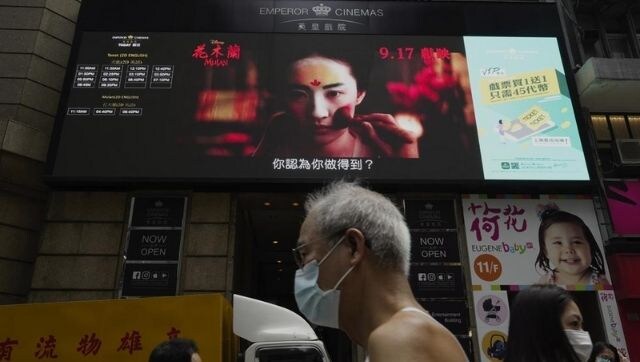The Girlfriend Experience: In Season 3, sex is power and data is everything
Costumes aside, there’s very little sexy about this show about sex. For the sex isn’t used to titillate, but illustrate a transactional world where the whole world is a commodity.

Julia Goldani Telles as Iris Stanton
More than three million students in the US have reportedly used Seeking’s sugaring platform to pay off college debt. The website even has a separate Sugar Baby University (SBU) section with a live debt counter, and an advertorial on how its cash-for-companionship deal can provide students an “elevated experience.” In Shiva Baby, Rachel Sennott’s Danielle isn’t sugaring to pay off college debt, like many cash-strapped students. Her parents are already paying for college and most everything else — and keep reminding her of it. The handouts guilt her into going to family events. It’s a transactional relationship of sorts too. It’s why Danielle holds a lot more power in the relationship with her sugar daddy, than with her parents.
Which really plays into the old adage “sex is power.” It’s also the thesis statement of The Girlfriend Experience (streaming on Lionsgate Play). The original Steven Soderbergh film explored the world of monetised dating through the eyes of an escort working in the middle of the 2008 financial crisis. In its second life as an anthology series from Lodge Kerrigan and Amy Seimetz, The Girlfriend Experience (TGE) began to truly examine all the intersectionalities of transactional sex. Season 1 saw Riley Keough play a law student who worked as a high-end escort to relieve some financial stress, before finding some power along with it. Season 2 was set against the backdrop of American politics and criminal justice system. The just-concluded Season 3 complicates the relationship between sex and power further by linking it to AI and VR.
Kerrigan and Seimetz pass the mantle to writer-director Anja Marquardt, who sets the third instalment in a London deep tech start-up. Julia Goldani Telles stars as a neuroscience major who cuts short her Ivy League education to relocate to the British capital. By day, she works for NGM, a company designing an AI matchmaking service based on predictive behavioural data. By night, she works for the V, an escort service that covers everything from dinner to sex to those who can afford it. There’s a strange synergy to her main and side gigs. The emotional responses of the men she meets prove to be invaluable research to refine NGM’s AI algorithm, and what she learns at NGM help her provide a better “girlfriend experience” to her clients. Before long, the two worlds collide.
Marquardt’s debut feature She’s Lost Control had tread familiar ground. The personal and professional lives of a behavioural psychologist — who doubles as a sex surrogate for men with intimacy issues — similarly clashed. The anthology format of TGE affords Marquardt the creative freedom to explore her own thematic concern: AI as a black mirror to human nature. To make AI more “human,” the machine must learn how to read, decode and respond to emotions. But what we do on instinct, the AI can only mimic as fed into its code. The AI in TGE tries to mimic Iris’s verbal and nonverbal signals to build its artificial neural network. And what better way to predict human nature than using the data mined from them at their most intimate and thus vulnerable? A girlfriend, be it real or rented, is privy to a side the clients wouldn’t dare reveal to others. Ask the hosts in Westworld.
The new season’s setting feels cold in a proto-Westworld way, with its pristine metropolis, luxury apartments, glass-walled offices, and sterile underground labs. The experience of watching the show too occasionally resembles that of watching the HBO series, as characters indulge in science-speak and exposition. NGM hopes to achieve what Delos Inc. already has: “Training AI to train itself until it understands human nature better than we do,” as Hiram (Armin Karima), Iris’s colleague at NGM describes their end-goal. The show plays with our perception of what is real and what is a simulation right from the opening scene, where Iris interviews to join the V via VR. Marquardt keeps the visuals and the text deliberately out-of-sync. Iris’s words are heard via voice-over but her lips don’t move. This gap between sound and image undermines the illusion of reality by acknowledging its construction.
Telles as Iris is all instinct. She fine-tunes her character according to requirement in much the same way Iris improvises identities based on the emotional needs of the men or hones the AI algorithm — with clinical precision. Wielding clothing like a weapon, Iris runs through a rotating wardrobe of effortlessly chic dresses.
Costumes aside, there’s very little sexy about this show about sex. For the sex isn’t used to titillate, but illustrate a transactional world where the whole world is a commodity.
With the explicit financial agreement built into it, sugaring and the girlfriend experience operate in the legal grey area that is monetised dating. But there is no stigma or judgment in TGE’s approach. Like Shiva Baby did recently, it shows a woman simply savvy to the ways she can capitalise on her own body. It adds to the growing sex-positive movement, presenting sex work for what it is: work. Sex is a way for these women to gain ownership over their own bodies, and it empowers them to seek mutually beneficial relationships of their preference.
What’s alarming here isn’t the "unsexy" sex, but the invasion of privacy. What TGE depicts is nothing but an extension of how today’s companies are leveraging data they collect from us to power their deep learning. Marquardt raises some of the same concerns over Big Data and privacy we have all had ever since we learnt Facebook has been harvesting the personal data of millions of users. Its “sex is power” tale serves a cautionary lesson on companies, which treat everything as transactional. For Big Data is guided by an adage of its own: “Data is everything, everything is data.”
All three seasons of The Girlfriend Experience are now streaming on Lionsgate Play.
also read

Hong Kong govt to ban films that 'endanger national security' or question state's methods
The Hong Kong government now have the power to ban films from exhibition to “prevent or suppress any act or activity endangering national security,” it said in a statement.

Pixar's Luca, featuring Jacob Tremblay, revels in director Enrico Casarosa's warm, whimsical aesthetic
Luca has a few notes of gentle melancholy, but it isn’t the kind of Pixar movie that will turn adult viewers into bawling, trembling wrecks

Netflix's Penguin Town explores endangered life of African critters who make annual trips to South Africa's Simon Town
Endangered African penguins usually arrive in November and stay for six months, mixing with humans as they go about their penguin tasks, which includes finding a nest and breeding


